Menu
Common Questions: MSN – Psych-Mental Health Nurse Practitioner Online

The Master of Science in Nursing – Psych-Mental Health Nurse Practitioner (MSN – PMHNP) degree is for RNs who want to specialize in a vital field of healthcare and have greater practice authority in working with patients. This form of advanced practice nursing becomes more essential each year as the nation's psychiatric and mental health service system adapts to a host of challenges. This includes a declining number of psychiatrists and too few treatment beds for those who need care.
PMHNPs take a holistic approach to treating vulnerable and at times stigmatized populations. These RNs provide comprehensive care regardless of the diagnosis or the complexity of behavioral issues involved. As a PMHNP, you may work with patients with thought disorders such as schizophrenia or bipolar disorder, addiction to prescription medications or street drugs, depression or anxiety, or diseases linked to the aging brain such as Alzheimer's and dementia. PMHNPs also work in a wide variety of healthcare settings, from schools, hospitals and private care facilities to nonprofit clinics, government agencies and prisons.
If you are passionate about a career in this high-demand, high-reward area of healthcare, earning your MSN – PMHNP degree online can help you achieve your goals.
What Is a Master of Science in Nursing – Psych-Mental Health Nurse Practitioner Degree?

The MSN – PMHNP degree is required for RNs who want to become an advanced practice registered nurse (APRN) specializing in psychiatric and mental healthcare. PMHNP students complete graduate coursework and participate in supervised clinical practice, blending theory and research with hands-on experience. Clinical hours are typically 500-700 depending on the school and program.
NKU's online MSN – Psych-Mental Health Nurse Practitioner program prepares students for the Psychiatric Mental Health Nurse Practitioner board certification exam (PMHNP-BC) administered by the American Nurses Credentialing Center (ANCC), as well as the responsibilities that come with professional licensure in this nursing discipline.
Is a PMHNP's Scope of Practice More Similar to That of a Physician or a Psychiatrist?
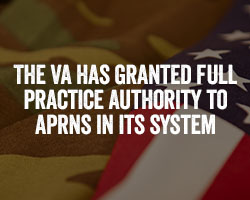
While practice authority for all nurse practitioners is governed by state laws and regulations, PMHNPs are a bit unique in their scope of practice. RNs with a PMHNP-BC credential see and diagnose patients, design treatment plans, prescribe medications, and monitor their patients' progress just as a physician or a psychiatrist might. They are also qualified to provide both one-to-one and group counseling, which differs from the scope of other nurse practitioners. So while PMHNPs are not doctors, they play a role in patient care that can be just as important.
In many states, PMHNPs must still work under the supervision of a physician and psychiatrist, but in some places they can see patients independently as well. The American Association of Nurse Practitioners has the most current information on practice authority for NPs of all specialties.
The U.S. Department of Veterans Affairs grants full practice authority to PMHNPs working anywhere in its system, regardless of the state where the hospital, outpatient clinic or treatment facility is located.
What Will I Learn in an MSN – PMHNP Degree Program?
You will learn to provide comprehensive psychiatric and mental healthcare to people dealing with acute, chronic or episodic illness. Students are trained in a range of assessment tools and treatment modalities, various forms of psycho-social intervention, and the proper use of prescription medications. Clinical residencies also provide students the opportunity to work with patients across the lifespan, gaining valuable experience in different PMHNP roles and care settings.
What Kinds of Courses Will I Take For an Online MSN – PMHNP Degree?
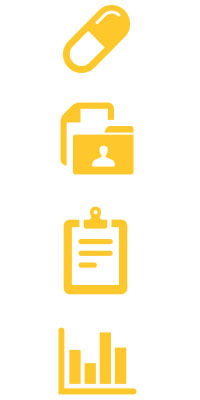
MSN – PMHNP coursework focuses on the core skills and knowledge that RNs working with psychiatric and mental health patients need to provide ethical care and effective treatment. You will learn about patient evaluation and care planning, strategic use of medication and interventional therapies, and the role research can play in PMHNP practice. You will also learn the legal and professional standards of this dynamic career field.
Students in NKU's online MSN – PMHNP program take a combination of core and concentration courses, including:
- Theoretical Foundations of Nursing Practice and Research
- Human Pathophysiology
- Psychopathopharmacology
- Diagnostic Reasoning and Advanced Clinical Assessment
- Advanced Clinical Pharmacology and Intervention for APRNs
- Analysis and Application of Health Data for Advanced Nursing Practice
- Healthcare Policy and Economics in Population Health
- Psych-Mental Health NP Capstone
Visit the courses section of the program website to learn more.

—Mark Bartruff, graduate, NKU MSN – PMHNP online program
Are MSN – PMHNP Online Courses As Challenging As Courses Taught on Campus?
Yes. Online MSN – PMHNP courses are just as rigorous as equivalent coursework in a traditional on-campus program, because students in both learning environments must acquire the same core knowledge and nursing skills to earn their degree and achieve board certification.
What Are Online PMHNP Program Admission Requirements?
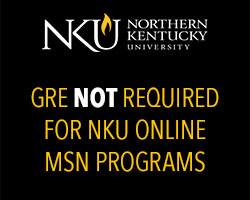
Admissions criteria can vary between schools, but most MSN – PMHNP online programs require that you have:
- A Bachelor of Science in Nursing from an accredited program or university
- An active and unencumbered nursing license in the state where you practice
- Work experience as an RN
- Official transcripts documenting all previous college or university coursework, grades earned, and your GPA
- An undergraduate statistics course with a grade of "C" or better
Each program sets its own minimum GPA for admission (3.0 is common), as well as other requirements applicants must meet. You may be asked to submit GRE scores, professional references, a current resume or a statement of purpose. A background check is sometimes required, along with proof of professional certifications, liability insurance and any required immunizations.
NKU's online MSN – PMHNP program has a straightforward admissions process that helps applicants speed through the steps and get going on their degree, with no GRE scores required.
Do I Need a Background in Psychiatric or Mental Health Nursing to Apply?
No. You can apply to most MSN – PMHNP online programs as long as your RN license is active and you have work experience in any area of nursing.
I've Heard Nursing Program Accreditation Is Important – Why Does It Matter?
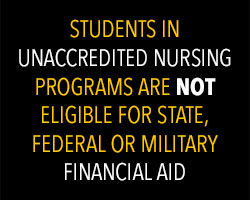
Accreditation matters for a number of reasons. When a school or one of its degree programs meets the standard required to receive accreditation, you can feel confident that a degree from that institution has value and that graduates are properly trained for the careers they seek.
Nursing programs accredited by the Commission on Collegiate Nursing Education (CCNE) or the Accreditation Commission for Education in Nursing (ACEN) have undergone this thorough review process evaluating every aspect of their teaching and operations.
For RNs, accreditation also matters because nursing students are not eligible for state or federal financial aid if they attend an unaccredited degree program. And course credits from unaccredited nursing programs may not be accepted at other schools. Most healthcare employers strongly prefer to hire RNs who have a degree from an accredited school or program as well.
How Can I Tell Whether a Nursing Program Is Accredited?
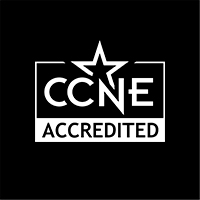
The U.S. Department of Education has a free resource that can help. You can use the online Database of Accredited Postsecondary Institutions and Programs (DAPIP) to check the accreditation status of any nursing program located in a U.S. state or territory.
NKU's online MSN – PMHNP degree program is CCNE-accredited.
How Do Clinicals Work in an MSN – PMHNP Online Program?
Clinicals are always required for the MSN – PMHNP degree, even if you are earning it online, so schools and students tend to work together to facilitate this important part of PMHNP education.
Sites and preceptors are often based on each student's location and priorities. Placements can be developed to help a student explore different areas of psychiatric and mental health nursing or to align with career plans after graduation.
NKU's online MSN – PMHNP students complete four separate clinical residencies during their time in the program, and many look forward to this exciting stage in their progress toward the degree.
Who Sets up the Clinical Placement and Chooses My Preceptor?
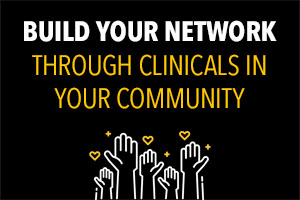
RNs studying in online MSN – PMHNP programs usually have the option of making their own clinical arrangements, giving them more freedom to tailor these essential nursing residencies to their specific goals and interests.
A written agreement will need to be drafted for each clinical placement 60 to 90 days before it is scheduled to begin, so that your program has time to approve your site and preceptor. Doing your clinicals in your local community or in a nearby city where you hope to work after graduation can also help build your professional network and demonstrate your value to potential employers.
Can I Do My Clinicals Where I Currently Work?

Most PMHNP programs frown on this type of arrangement because the point of doing clinicals is to gain experience in new areas of practice, whether that's a different aspect of nursing or a patient population you may not have treated before.
Some PMHNP programs will allow one placement with a current employer on three conditions:
- The clinical site must be located outside of the unit, clinic or part of the organization where you regularly work.
- The preceptor must be someone other than your current work supervisor.
- Your clinical duties and patients must not overlap with those at your current paid nursing job.
If you work in a hospital-based psychiatric inpatient clinic for teens, for example, you could pursue a clinical residency in the hospital's outpatient clinic for adults, on a research and analytics project, or in a satellite treatment facility that's part of the hospital network. Just be sure to consult your program before pursuing this type of clinical arrangement.
Can Online MSN – PMHNP Students Get Help Making Clinical Arrangements?
Yes, and many students do. Just keep in mind that the level of assistance your nursing program can provide may at times depend on your location and the contacts that staff and professors have at their disposal. If you feel you may need some guidance or support in finding the right clinical site in your area of the country, be sure to ask any psych mental health NP programs you are considering about the assistance they can offer.
NKU's College of Health Professions has a strong reputation for providing individualized support to online students, including help with clinical placements.
What's the Career Outlook for PMHNPs?

The majority of nurse practitioners licensed to practice in the United States still specialize in primary care, creating strong demand for NPs specializing in psychiatric mental healthcare for individuals or families. So when you choose to train as a PMHNP, you join a select group of clinicians being aggressively recruited to address some of our nation's most critical healthcare issues.
In many parts of the country, PMHNPs have become the vital bridge to care that hospitals, clinics, treatment centers and health departments need to continue offering quality services to the populations they serve. Some psych mental health nurse practitioners are also going into private practice or working in rural and remote areas to help address growing physician shortages there.
Employers recruit PMHNPs to fill the care gaps created by a shortage of psychiatrists as well. Unlike professional counselors, therapists and most psychologists, psych mental health nurse practitioners have expertise in psychopharmacology, and they can prescribe medication. PMHNPs are also valued for their holistic approach to diagnosis, care planning and treatment.
What Is the Average PMHNP Salary?
According to the U.S. Bureau of Labor Statistics, the median annual salary for all nurse practitioners of all types is over $120,000 per year. However, APRNs with PMHMP specialization are making more in many cities, and compensation can also include signing bonuses and other incentives.
Many PMHNPs also find they can make a good living working short-term locum tenens assignments in different cities or regions of their state, rather than taking on a permanent position.
Are PMHNP Jobs More Common in Public or Private Healthcare Settings?

PMHNP jobs are available in a diverse range of healthcare settings, whether you want to work in the public or private sector. Regardless of your interests, there are many different types of employment you can pursue once you achieve your PMHNP-BC certification.
Here are a few examples of the settings where PMHNPs practice.
Public Healthcare
- County and municipal health departments
- City and county hospitals, jails and treatment centers
- Nonprofit hospitals, clinics and organizations
- Online mental health advocacy and crisis support organizations
- Public university teaching hospitals and student health centers
- Local school districts
- State and county rural healthcare programs
- State and federal prisons
- State facilities and independent living centers for people with disabilities
- Military and VA hospitals, clinics and treatment centers
- Government agencies (administration, research, or public policy work)
Private Healthcare
- Corporate-owned hospitals and residential treatment centers
- Health technology businesses providing mental health services online
- Company wellness programs, on-site clinics and employee assistance programs
- Student health centers at private colleges and universities
- Psychiatrist and physician practices
- Insurance and pharmaceutical companies
- Private prisons and holding facilities
- Athletic training and performance consulting firms
- Healthcare recruiting and placement agencies
- Private PMHNP practice or consulting
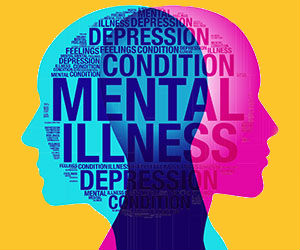
Spotlight: Demand for PMHNPs in Rural Areas
Rural populations have a critical need for psychiatric and mental health services. Many small towns and remote areas had inadequate psychiatrist or physician coverage even before the COVID-19 pandemic. In areas that also lost a regional hospital or local clinic during that period, finding support can be especially challenging.
It's not that uncommon for rural PMHNPs to be one of the few clinician groups in a county or community with the specialized training required to work with patients experiencing anxiety, depression, addiction, dementia, severe mental disorders or other forms of psychiatric and mental illness. The lifesaving care they can provide fills a critical gap and also supports local physicians and RNs.
PMHNPs can be found in a variety of rural healthcare settings, including critical access hospitals and VA centers, satellite clinics and treatment facilities. In many states they can also work with patients online, an essential support option for residents living in the most remote locations.
Can PMHNPs Qualify for Mental Health Professional Shortage Area Incentives?
Yes. There is much demand for PMHNPs in both rural and urban Mental Health Professional Shortage Areas (MHPSAs), as designated by the U.S. Health Resources and Services Administration (HRSA). In many states, PMHNPs are helping to address service disruptions created when patients cannot get the psychiatric or mental healthcare they require in a timely manner, or at all.
Federal and state incentive programs for advanced practice nurses working in shortage areas include the Nurse Corps Scholarship Program and Loan Repayment Program, the National Health Service Corps Scholarship Program and Loan Repayment Programs, the State Loan Repayment Program and the Indian Health Service loan repayment program.
Opportunities and incentives for PMHNPs can be most robust in states where a high percentage of counties have been designated as full or partial shortage areas for mental health services, and low numbers of the population are receiving the care they require.
Will an Online MSN – PMHNP Degree Cost Less Than the Same Degree On Campus?

It depends on the programs you are considering, but online study does often cost less than getting your degree on campus. The number of schools offering the MSN – PMHNP degree is relatively small compared to popular APRN specializations such as the MSN in primary care, so be sure to compare your options based on more than just the tuition rate. Residency requirements, student fees, the number of credit hours required and your potential time to degree can all factor into the overall cost.
Do Online Degree Programs Charge Out-of-state Tuition?
At most schools, all students in the online MSN – PMHNP degree program pay the same tuition rate, regardless of where they live and study. While a handful of online nursing programs do charge higher tuition rates for out-of-state students, you'll find this is the exception, not the rule.
All students in NKU's online MSN – PMHNP program pay the same tuition rate.
Can Online Students Get Financial Aid?
Yes they can! As long as your nursing program is accredited and you qualify for financial aid, you should have access to the same state and federal aid programs that on-campus students use to fund their education. These include student loans, grants and scholarships.
AACN's extensive list of nursing scholarships is another great resource, and don't forget that your employer may offer tuition reimbursement or other assistance to help pay for school as well.
Are Military Education Benefits an Option to Pay for My Online Degree?
If you have access to education benefits from any branch of the service, you can use those benefits to cover costs for your online MSN – PMHNP degree. Just make sure that the nursing school you choose is accredited, as that's a standard eligibility requirement.
How Long Will It Take to Earn My MSN – PMHNP Degree Online?
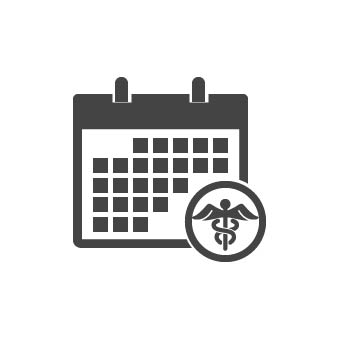
The answer to this question depends largely on the nursing program you choose, and the amount of time you can devote to classes. You should be able to complete your MSN – PMHNP degree online in two or three years with consistent study. But if your study time is limited, or you feel most comfortable taking fewer courses over a longer period, you can also move through the coursework at your own speed.
NKU's online MSN – PMHNP degree can be completed in as few as 22 months, including all coursework and clinicals.
Is It Possible to Keep Working While I Get My MSN – PMHNP Degree Online?

Absolutely! Online MSN – PMHNP degree programs are designed with working nurses in mind. They are perfect for RNs who have busy, complicated lives that may not include working traditional hours or studying on a regular schedule.
Online courses give you the freedom to study whenever it's most convenient. You can complete assignments at the times and places that suit you best, whether that's on your days off or in small increments through the work week. And since your professors and classmates are also RNs, you'll be working with peers who share your passion for nursing and who understand the juggling act that going to college while working as a nurse can be.
What Are Online MSN – PMHNP Courses Like?

They are organized and efficient, providing students with great resources, a clear timeline of readings and assignment deadlines, and opportunities to participate in group and individual discussion of the topics studied.
Each MSN – PMHNP program uses a different online course management interface, but most online classes operate in a similar manner. Students log in to their course, find the syllabus and textbook information, review the content modules and then get to work. It's also common for professors to provide lectures on video, notes or presentations, or other material for students that complements the assigned readings.
You can even submit assignments and see your grades online, and easily track your progress throughout the course.
Will I Have Classmates in My Online MSN – PMHNP Courses, or Work Alone?

You will have classmates in online courses, and there are plenty of opportunities to work together and alone. All students participate in conversations on the discussion board, and they also work together online during group assignments or projects at times. Since it's so easy to interact, many students find they form friendships in the online classroom just as easily as they might in an on-campus course.
Whatever your preference for interaction, online courses allow you to control the experience, and explore new ways to communicate your thoughts and opinions.
Do Professors Who Teach Online Have Clinical Experience?
Yes. Professors in online MSN – PMHNP courses are typically RNs with an MSN or doctoral degree who have extensive clinical experience. They come to higher education from careers in many different areas of psychiatric and mental health nursing, and many continue to practice as PMHNPs.
How Do Online Professors Interact With Students?
Professors in online MSN – PMHNP courses are easily accessible, whether you want to discuss the course material or have a question. They may interact with you through conversations on the discussion board or provide feedback about your work via comments attached to your graded assignment online. You can also contact them via email or schedule a video chat, and some are available by phone or text.
The important thing to remember is that you are not expected to be totally independent as an online student. When you take an online MSN – PMHNP course, professors are ready and available to assist you, and they are engaged in your learning experience.
What Are the Technology Requirements for Online MSN – PMHNP Courses?
It's a good idea to make sure the laptop, desktop or tablet computer you'll be using is updated with the most recent operating system it uses, and that you also have the latest version of the web browser you prefer. Otherwise, just check that your system can handle activities that are common to online courses, such as:
- Streaming audio and video
- Creating papers, presentations, and spreadsheets
- Video chat and online meetings
- Using and saving large files (internally, on a drive or in cloud storage)
Check out NKU's technical guide for online students for more information on this topic.
Are There Good Support Services For Online Students?
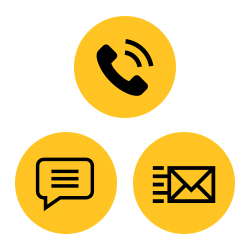
All online nursing programs want to ensure that students can access their courses and the resources they need to do well, so you will find most schools have good support options. Remote library access, tech support and writing center assistance are commonly available to online students in graduate nursing programs, but be sure to check with schools you are interested in to learn more.
NKU is known for its strong academic support for online students, including its online writing center, peer tutoring, and on-demand professional tutoring services. MSN – PMHNP students can do research in the library catalog online, and access librarian live chat for additional assistance. Tech support is also available via phone, email or live chat.